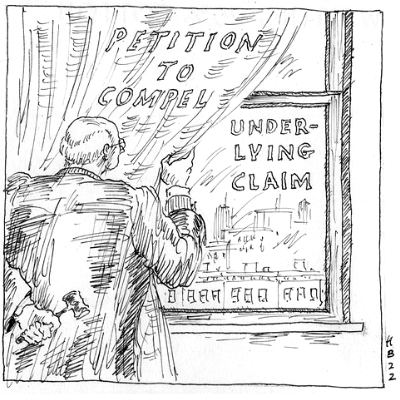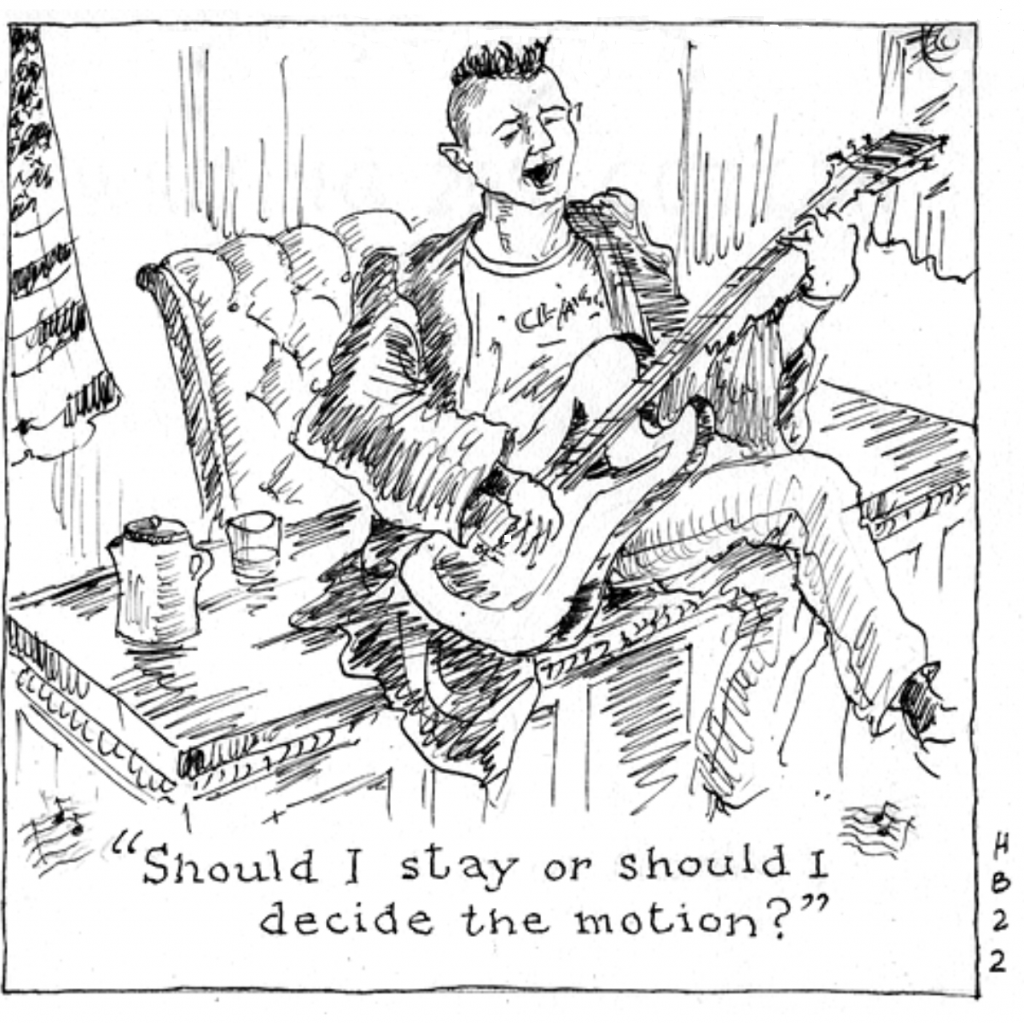

Absent diversity of citizenship, federal courts lack jurisdiction over petitions to confirm or vacate domestic arbitration awards, even where the underlying claims arise under federal law.
Badgerow v. Walters, No. 20-1143 (U.S. March 31, 2022).
 U.S. Federal courts are courts of limited jurisdiction, which Congress and the Constitution have defined to include two main categories: “diversity” jurisdiction (suits between citizens of different states or between U.S. and foreign citizens) and “federal question” jurisdiction (suits involving claims based on federal law). In turn, while the Federal Arbitration Act (the “FAA”) authorizes a party to an arbitration agreement to petition for various forms of relief, it does not itself create the subject-matter jurisdiction necessary for a federal court to resolve them. Rather, the federal court must have an independent jurisdictional basis to do so, or the petition must be brought in state court.
U.S. Federal courts are courts of limited jurisdiction, which Congress and the Constitution have defined to include two main categories: “diversity” jurisdiction (suits between citizens of different states or between U.S. and foreign citizens) and “federal question” jurisdiction (suits involving claims based on federal law). In turn, while the Federal Arbitration Act (the “FAA”) authorizes a party to an arbitration agreement to petition for various forms of relief, it does not itself create the subject-matter jurisdiction necessary for a federal court to resolve them. Rather, the federal court must have an independent jurisdictional basis to do so, or the petition must be brought in state court.
In Vaden v. Discover Bank, 556 U. S. 49 (2009), the Supreme Court held that for petitions to compel arbitration under Section 4 of the FAA, federal question jurisdiction is determined by “looking through” the petition to the underlying claim sought to be arbitrated. If that claim would, save for the arbitration clause, be subject to federal jurisdiction, the federal court has jurisdiction over the petition to compel. This approach is required by the express terms of Section 4, which allows a petition to compel arbitration in a “United States district court which, save for agreement, would have jurisdiction,” meaning the statute requires courts to assume the absence of the arbitration agreement in determining whether they have jurisdiction over petitions to compel. Thus, in actions to compel arbitration, federal jurisdiction depends on the nature of the underlying claim. Absent diversity of citizenship, a petition to compel may be brought in federal court if the claim sought to be arbitrated raises a federal question.
In Badgerow, the Supreme Court considered whether the same “look through” approach applies in determining federal jurisdiction over an action to confirm or vacate an award under FAA Sections 9 and 10.
Badgerow arose out of an employment arbitration in which Petitioner-employee Denise Badgerow alleged that she had been unlawfully terminated by Walters, her employer. After the arbitrators issued an award in Walters’s favor, Badgerow filed suit in state court in Louisiana to vacate the award on the basis of fraud in the arbitral proceedings. Walters removed the case to federal court and applied for confirmation of the award. Badgerow sought to remand the case to state court arguing that the federal court lacked jurisdiction over the parties’ respective requests to confirm or vacate the award. The district court, applying the Vaden “look through” approach, found that it had jurisdiction because Badgerow had raised federal law claims in the arbitration. Finding no fraud in the arbitral proceedings, the district court granted Walters’s application to confirm, and denied Badgerow’s application to vacate the award. On appeal, the Fifth Circuit affirmed.
The Supreme Court reversed, holding that the “look through” approach does not apply to petitions to confirm or vacate awards under FAA Sections 9 and 10, which “contain none of the statutory language on which Vaden relied.” In particular, “those provisions do not have Section 4’s ‘save for’ clause[,]” and do not mention the court’s subject-matter jurisdiction at all. For the Court, Congress’s inclusion of particular language in one portion of a statute and its omission in another is presumed deliberate, and courts are not at liberty to “pull[] look through jurisdiction out of thin air[.]” The FAA’s statutory plan makes Sections 9 and 10 petitions “conform to the normal—and sensible—judicial division of labor: The applications go to state, rather than federal, courts when they raise claims between non-diverse parties involving state law.” Although the FAA provides the standard for vacatur or confirmation, petitions under Sections 9 and 10 principally concern contractual rights provided in the arbitration agreement, which generally belong in state court. The Court reasoned, Congress deliberately created an exception for Section 4 petitions to compel because the preeminent purpose of the FAA (adopted in 1925) was to overcome some judges’ reluctance to enforce arbitration agreements, whereas no such concern existed with respect to the courts’ willingness to enforce arbitral awards.
The upshot of Bagerow is to largely relegate actions to confirm or vacate awards under the FAA to state courts, absent diversity of citizenship. It is important to note, however, that Badgerow governs only enforcement actions concerning domestic awards. The FAA separately provides an independent basis for federal jurisdiction over enforcement actions for international arbitration awards governed by the New York or Panama Conventions, and when such petitions are brought in state court, it permits them to be removed to federal court. See 9 U.S.C. §§ 203 and 302.
Read the court’s full decision here.
As with other contractual rights, waiver occurs when a party evinces an intent to relinquish the right to arbitrate, regardless of whether there is prejudice to the other party.
Morgan v. Sundance, Inc., No. 21-326 (U.S. May 23, 2022).
Arbitration is a matter of contract. Like any other contractual right, a party may waive the right to arbitration. A waiver is “the intentional relinquishment or abandonment of a known right.” Under federal law, the focus of the waiver inquiry is generally on the conduct of the party asserting the right, without regard to the impact on the opposing party. However, in the context of the right to arbitrate, nine federal appellate circuit courts have imposed an additional requirement of prejudice to the opposing party. These courts have cited the strong federal policy favoring arbitration as justification for this added protection against the waiver of the right to arbitrate. In Morgan, the Supreme Court clarified that under federal law, ordinary waiver rules, which require no showing of prejudice, apply in determining whether a party has waived its right to arbitrate.
In Morgan, the plaintiff had brought a nationwide collective action against a Taco Bell franchisee, alleging violations of the Fair Labor Standards Act, principally concerning the failure to pay employees earned overtime. The lead plaintiff had signed an arbitration agreement, agreeing to “use confidential arbitration, instead of going to court.” Nevertheless, Sundance originally defended against the action as if no arbitration agreement existed. It filed a motion to dismiss, arguing that Morgan had to either join an existing class action brought by other Taco Bell employees, or refile her claim on an individual basis. When the district court denied that motion, Sundance answered, asserting 14 affirmative defenses, none of which invoked the arbitration agreement. The defendant then participated in a joint mediation with the named plaintiffs in both class actions. Nearly eight months after Morgan filed the complaint, when settlement talks proved unsuccessful, Sundance moved to stay the litigation and compel arbitration.
Morgan opposed the motion, arguing that Sundance waived the right to arbitrate by participating in the litigation. The district court, applying Eighth Circuit precedent, found that a special waiver rule applied to the right to arbitrate, which required a showing of prejudice to the party resisting arbitration. The court found that such prejudice existed, and denied the motion to compel. On appeal, the Eight Circuit reversed, finding that Morgan was not prejudiced by Sundance’s delay in asserting its right to arbitrate, because the parties had not begun formal discovery or litigated any matters going to the merits of the claims.
The Supreme Court reversed, holding that there is no prejudice requirement when applying the doctrine of waiver to the right to arbitrate, because “a federal court assessing waiver does not generally ask about prejudice.” Rather, the “court focuses on the actions of the person who held the right; the court seldom considers the effects of those actions on the opposing party,” and the same rule should apply, the Court said, when the right at issue is one to arbitrate. The strong federal “‘policy favoring arbitration’ does not authorize federal courts to invent special, arbitration-preferring procedural rules.” The policy derives from the historical judicial hostility to agreements to arbitrate and is intended to “make ‘arbitration agreements as enforceable as other contracts, but not more so.’” Thus, while a court must hold a party to its agreement to arbitrate as it would any other contract, it “may not devise novel rules to favor arbitration over litigation.” As with any other contractual right, if a party, through its actions, evinces an intent to relinquish the right to arbitrate, the right is waived. Once waived, it may not be later invoked, regardless of whether the change of course prejudices the other side.
It is important to note that the Court only addressed waiver under federal law. The parties “disagreed about the role state law might play in resolving when a party’s litigation conduct results in the loss of a contractual right to arbitrate,” the courts below treated the question as one of federal law, and the Court “assumed without deciding” that they were right to do so. Thus, it remains to be seen whether and in what context questions of waiver or other procedural bars to enforcing the right to arbitrate should be decided under state law, and whether the application of a specific state’s law might yield a different result.
Read the court’s full decision here.
A fork-in-the-road clause concerns when, not whether, the contractual duty to arbitrate arises.
Olin Holdings Limited v. State of Libya, Case No. 21-cv-4150 (S.D.N.Y. March 22, 2022).
 Some investment treaties contain so-called “fork-in-the-road” clauses, which require an investor to choose between litigating its claims in the host State’s domestic courts or before an international arbitral tribunal. As the name suggests, once the investor chooses one forum, that decision is final and the other forum is no longer available. The United States District Court for the Southern District of New York, in Olin Holdings, had to determine who between courts and the arbitrators decide whether an arbitration provision contains a fork-in-the-road clause and, if so, whether the investor had made the election depriving the arbitrators of jurisdiction.
Some investment treaties contain so-called “fork-in-the-road” clauses, which require an investor to choose between litigating its claims in the host State’s domestic courts or before an international arbitral tribunal. As the name suggests, once the investor chooses one forum, that decision is final and the other forum is no longer available. The United States District Court for the Southern District of New York, in Olin Holdings, had to determine who between courts and the arbitrators decide whether an arbitration provision contains a fork-in-the-road clause and, if so, whether the investor had made the election depriving the arbitrators of jurisdiction.
Cypriot company Olin had leased a tract of land in Libya’s capital, Tripoli, to construct a dairy factory. After receiving the required licenses from the Libyan authorities, Olin constructed the factory. In October 2006, shortly after the factory was completed and was set to begin operations, Olin received an eviction notice requiring it to vacate the premises. Unbeknownst to Olin, a Libyan authority had expropriated a large area that included Olin’s factory. After having sought exemptions from the expropriation order, to no avail, it filed an action in the Tripoli Court of Appeal challenging the expropriation. The Tripoli court held that the expropriation was procedurally improper and cancelled the expropriation order. Shortly thereafter, Olin received a second eviction notice, and commenced new proceedings in the Tripoli court seeking compensation for the harm resulting from the expropriation. The Tripoli court denied Olin relief, finding that Olin failed to prove the harm it suffered.
Olin then commenced arbitration against Libya before the International Chamber of Commerce (“ICC”), claiming that Libya’s expropriation and failure to award just compensation violated the Cyprus-Libya Investment Treaty. Olin invoked the arbitration provision in Article 9.2 of the Treaty, which provides that in the event of a dispute between a contracting state and an investor of the other state, the dispute “would be submitted, at the choice of the investor concerned to: (a) the competent court of the Contracting Party in whose territory the investment was made; or (b) the Arbitral Tribunal of the International Chamber of Commerce.”
Libya objected to the tribunal’s jurisdiction, arguing that Article 9.2 constituted a “fork-in-the-road” clause, and that Olin’s decision to commence proceedings in the Tripoli Court precluded it from later commencing arbitration. The parties submitted this question to the arbitrators, who issued an 88-page jurisdictional award concluding that Article 9.2 did not contain a “fork-in-the-road” clause because it lacked language present in other investment treaties such as “definitive, irrevocable, or any other words suggesting that the choice of one forum would preclude the use of another.”
The parties then arbitrated the merits, and the tribunal ultimately issued a final award finding that Libya had breached several treaty provisions and awarding Olin approximately €20 million, plus interest.
Olin filed a petition with the U.S. District Court for the Southern District of New York to confirm the award. Libya opposed enforcement under Article V(1)(c) of the New York Convention, arguing that Article 9.2 of the Treaty was a “fork-in-the-road” clause, and Olin’s commencement of proceedings first in Libyan courts deprived the tribunal of jurisdiction. In the alternative, Libya moved to dismiss the petition on forum non conveniens grounds.
The court rejected Libya’s argument that the tribunal lacked jurisdiction. Whether Article 9.2 contained a fork-in-the-road clause was a “gateway” procedural question, rather than one of arbitrability. Whereas arbitrability questions concern whether the parties are bound by a given arbitration clause or whether such clause covers a particular type of controversy, “gateway” issues merely concern the meaning and application of particular procedural preconditions for the use of arbitration, such as waiver, laches, notice requirements, or time-limits. These procedural preconditions, “determine[ ] when the contractual duty to arbitrate arises, not whether there is a contractual duty to arbitrate at all.”
Courts presume that parties intend for the arbitrators to decide such procedural matters, and therefore accord the arbitrators’ decisions on such matters “considerable deference.” Thus, the court would uphold the tribunal’s interpretation of Article 9.2 so long as the arbitrators “explain[ed] their conclusions in terms that offer even a barely colorable justification for the outcome reached.” The court found that the tribunal’s 88-page jurisdictional ruling giving careful attention to the treaty language and comparing it to language in other treaties met this standard.
Notably, the court further held that, were the fork-in-the-road question one of arbitrability, it would have nonetheless accorded the same degree of deference to the arbitrators’ decision. Ordinarily, courts presume that the parties intend courts, not arbitrators, to decide questions of arbitrability, generally reviewing such questions de novo, granting no deference to arbitrators’ jurisdictional determinations. However, where there is “clear and unmistakable evidence” that the parties agreed to arbitrate questions of arbitrability, the courts afford significant deference to the arbitrators’ jurisdictional determinations.
Courts commonly find a clear and unmistakable agreement to arbitrate arbitrability when the parties’ agreement calls for arbitration under institutional rules, such as the ICC Rules, that give arbitrators authority to rule on their own jurisdiction. However, here, the court went a step further and found that the parties had also agreed to arbitrate arbitrability after the arbitration commenced, by including the jurisdictional question in the Terms of Reference, which not only provided that the ICC Rules would apply, but specifically provided that the arbitrators would decide Libya’s objection based on the putative fork-in-the-road language. Having thus found an agreement to arbitrate arbitrability, if the fork-in-the-road issue were a question of arbitrability rather than procedure, the court would still accord the tribunal’s jurisdictional ruling the same considerable deference.
The court also denied Libya’s forum non conveniens argument. Under the doctrine, the court may dismiss an action, despite having jurisdiction, if there is an alternative forum to try the case and maintaining the case would be unduly burdensome to either the parties or the court.
Here, because the petitioner was a foreign party, its choice of forum was entitled to little weight. Moreover, even if the Libyan courts might be biased, France, as the seat of the arbitration, provided an adequate alternative forum. Nevertheless, the court found that Libya had not demonstrated that any private or public interests weighed against the court maintaining the case. Confirmation proceedings are summary in nature, and therefore do not require any substantial expenditure of public resources. Nor is there in any significant private burden, as there is no need for overseas discovery or securing foreign witness testimony. Under these circumstances, the mere fact that neither the parties nor the dispute had any substantial connection to the United States was insufficient to warrant the court declining to exercise its jurisdiction over the petition to confirm the award.
Read the court’s full decision here.
Collectability concerns due to mounting sanctions and other uncertainty from war in Ukraine warranted lifting of five-plus year stay of action to enforce award against the Russian Federation.
Hulley Enterprises Ltd., et al. v. The Russian Federation, Civil Action No. 14-1996 (D.D.C. April 13, 2022).
 Under Article VI of the New York Convention, one ground for refusing enforcement of an award is that it has been set aside or vacated by the courts at the seat. U.S. courts generally defer to such foreign judgments absent extraordinary circumstances. Federal courts have inherent discretion to stay actions to enforce foreign arbitral awards, which they often exercise when proceedings to set aside the award are pending before the courts of the seat. After all, entering judgment while such foreign actions are pending could mean having to reopen the matter if the award is later set aside. But, as Hulley shows, sometimes extraordinary circumstances require pressing forward in parallel with foreign set-aside proceedings.
Under Article VI of the New York Convention, one ground for refusing enforcement of an award is that it has been set aside or vacated by the courts at the seat. U.S. courts generally defer to such foreign judgments absent extraordinary circumstances. Federal courts have inherent discretion to stay actions to enforce foreign arbitral awards, which they often exercise when proceedings to set aside the award are pending before the courts of the seat. After all, entering judgment while such foreign actions are pending could mean having to reopen the matter if the award is later set aside. But, as Hulley shows, sometimes extraordinary circumstances require pressing forward in parallel with foreign set-aside proceedings.
In Hulley, the award creditors had initiated proceedings in 2014 before the U.S. District Court for the District of Columbia to enforce their $50 billion award issued by a Netherlands-seated tribunal against the Russian Federation. In 2016, after the parties had fully briefed Russia’s motion to dismiss on sovereign immunity grounds, a lower court in the Hague vacated the award, finding that the tribunal had lacked jurisdiction. This prompted the D.C. trial court to grant the award creditors’ motion to stay the proceedings pending their appeal in the Netherlands. The D.C. court extended the stay multiple times before, in November 2021, the Dutch Supreme Court reversed the lower court’s set-aside decision, finding that the arbitral tribunal did have jurisdiction to issue the award. While the Dutch Supreme Court’s decision resulted in the automatic lifting of the stay of the D.C. enforcement action, it did not bring the Dutch set-aside proceedings to a close. Rather, the Dutch Supreme Court remanded the case to the lower court to decide the Russian Federation’s claim that the award had been procured by fraud. The Russian Federation therefore petitioned the D.C. court to extend the stay of the U.S. enforcement action.
The court first rejected Russia’s contention that the same reasons for a stay remained as in 2016 because the march of time alters the equities, and the hardship to the award creditors, who prevailed in a decade-long arbitration in 2014, only increases with each passing year. Arbitration’s aims of expeditious dispute resolution and avoidance of protracted litigation militated against another stay because eight years after the award creditors filed the enforcement action, the very first step in the litigation – resolution of Russia’s sovereign immunity defense – remained pending.
As the Russian Federation’s motion to dismiss on sovereign immunity grounds was fully briefed and ripe for resolution, the court found that lifting the stay imposed a de minimis burden, which was far outweighed by the hardship a further stay would impose on the award creditors, particularly in light of recent developments following Russia’s invasion of Ukraine. While a Dutch judgment setting aside the award for fraud might provide a defense to recognition and enforcement, the court, citing recent D.C. Circuit precedent, noted that the “the validity or enforceability of an arbitral award is a merits question,” and the district courts “need not determine the validity of the arbitral award as part of [their] jurisdictional inquiry.” This meant that, “at a minimum, assessment of this Court’s jurisdiction is independent of any Dutch court ruling to set-aside—or not—the award.”
The court further found that the fact-intensive nature of Russia’s fraud allegations suggested that the remaining Dutch proceedings would likely take longer than the prior proceedings, and extending the stay for several additional years was unjustifiable.
Finally, the court reasoned that economic sanctions and other penalties imposed by the international community in the wake of Russia’s invasion of Ukraine militated in favor of the action moving forward, as such actions were likely to impair the award creditors’ ultimate ability to locate and execute on Russian assets.
Under these circumstances, it was appropriate to lift the stay and proceed to resolve the Russian Federation’s jurisdictional motion. Under federal law, the court’s decision on Russia’s motion to dismiss will be immediately appealable. If the appellate court rules that the district court has jurisdiction over the petitioners’ enforcement action before the Dutch proceedings conclude, it remains to be seen whether the D.C. court would move forward with the merits phase of the case, or further stay the proceedings.
Stay informed of Chaffetz Lindsey’s updates, new articles, and events invitations by subscribing to our mailing list.
